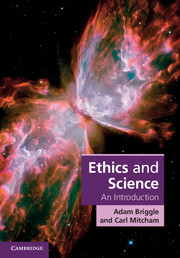Book contents
- Frontmatter
- Contents
- List of figures and tables
- Preface
- 1 Introduction and overview
- 2 Ethical concepts and theories
- 3 Science and its norms
- 4 Research ethics I
- 5 Research ethics II
- 6 Research ethics III
- 7 The science of ethics
- 8 Transition
- 9 Science and politics I
- 10 Science and politics II
- 11 Science and ideational culture
- 12 Science applied
- Epilogue Looking back, leaning forward
- Appendix Ethics codes
- Bibliography
- Index
Preface
Published online by Cambridge University Press: 05 November 2012
- Frontmatter
- Contents
- List of figures and tables
- Preface
- 1 Introduction and overview
- 2 Ethical concepts and theories
- 3 Science and its norms
- 4 Research ethics I
- 5 Research ethics II
- 6 Research ethics III
- 7 The science of ethics
- 8 Transition
- 9 Science and politics I
- 10 Science and politics II
- 11 Science and ideational culture
- 12 Science applied
- Epilogue Looking back, leaning forward
- Appendix Ethics codes
- Bibliography
- Index
Summary
Preface
This volume aims to introduce students of science and philosophy to issues that are sometimes thought peripheral to real science or real philosophy. As an introduction, it necessarily simplifies, hopefully in a manner that stimulates further reflection. With regard to those who doubt the centrality of ethics to science or science to ethics, our claim for centrality is argued from multiple perspectives. But most importantly, given the central influence of science on the character of the contemporary world and of ethics in human affairs, not to reflect on the ethics–science relationship is to limit self-understanding in the technoscientific human condition.
A brief word is in order here about how we conceive of both science and ethics as actors on the social stage. As for science, since the 1970s the interdisciplinary field of science, technology, and society (STS) studies has been arguing that science cannot properly be understood solely as a cognitive enterprise or method of knowledge production. Science is situated in economic, cultural, and political contexts that it both reflects and influences. Science and society co-construct each other through ideas and scientifically based technologies in ways that make ethics all the more relevant, even crucial, to the self-understanding of scientists. From an STS perspective, science must be recognized as technoscience, a view implicit in many of the arguments to be explored.
- Type
- Chapter
- Information
- Ethics and ScienceAn Introduction, pp. xiii - xviiiPublisher: Cambridge University PressPrint publication year: 2012

